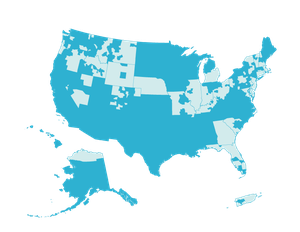This week, rural community leaders from across the country are convening in Washington for several days of debate and discussion on how best to raise standards of living in small towns across the country. Rural LISC is leading the effort, which will focus on everything from jobs and businesses to health, housing and the arts.
Small towns fight decline with rural brand of economic development that attracts businesses, improves health, stems population loss
Rural leaders from 42 states join forces in D.C. to chart growth strategies, build federal support
WASHINGTON, D.C. (May 23, 2016) – Community leaders are ramping up to to tackle poverty in rural America, targeting essential strategies to spur growth and attract new residents looking for good schools, safe streets and affordable homes.
Many of America’s top rural leaders will be in Washington, D.C., May 24-26 at the 2016 Rural LISC Annual Seminar to discuss how best to scale up economic development programs to help long-struggling towns and their residents. Key 2016 campaign issues – like jobs, health care and good housing – will be at the forefront of the gathering, organized by Rural LISC, a national community development program of the Local Initiatives Support Corporation (LISC). The conference will be held at the Holiday Inn Capitol, and the event is open to the press.
Many initiatives on the agenda are a counterpoint to the prevailing narrative that rural America is in unchecked decline, noted Suzanne Anarde, program vice president of Rural LISC, which has invested more than $1.06 billion to revitalize America’s small towns.
“Some people think of ‘rural’ in terms of homespun nostalgia while others see only battered local economies,” she said. “Neither is the whole story. Increasingly, Americans say they want to come back to the small towns where they grew up. That’s an opportunity to rebuild the tax base and local buying power—but we need to help communities strengthen their economic infrastructure to take advantage of it.”
Rural LISC works through a network of 75 nonprofit organizations in 42 states and 1,400 counties to support local community development programs in small towns and rural areas across the country.
The national Seminar will feature Lisa Mensah, under secretary for rural development for the U.S. Dept. of Agriculture. Other highlights include:
- Fueling rural business growth – Small business is the lifeblood of the U.S. economy and particularly critical in rural areas. Panelists from GROW South Dakota; Northern Initiatives of Marquette, Mich.; Hope Enterprise Corporation of Jackson, Miss.; and Communities Unlimited of Fayetteville, Ark., will explore opportunities for entrepreneurs and start-ups to access counseling, education and capital.
- Leveraging arts and culture – Experts from the South Carolina Arts Commission; National Endowment for the Arts; Tucker County Development Authority (Thomas, W. Va).; Dance Place, (Washington, D.C.); and ArtPlace America (Brooklyn, N.Y.) will offer ways to utilize arts and cultural programs to fuel the civic, economic and cultural life of rural communities.
- Building a public health approach to rural poverty – The data on rural health—from smoking, obesity and teen pregnancy to premature deaths—is deeply troubling. But some traditional community development strategies are proving to be powerful remedies. Dr. Megan Sandel, Boston University School of Medicine, will join Julie Willems Van Dijk from County Health Rankings Program, University of Wisconsin, and Tracy Menuez, from Human Resource Development Council in Bozeman, Mont., to outline strategies that work to help rural residents live longer and healthier.
Attendees will also be making their case to lawmakers in a series of Capitol Hill visits. To learn more about the event, visit www.lisc.org/rural. Get updates and follow key developments on Twitter @LISCRural and #EnvisionRural.
About Rural LISC
Rural LISC provides capital and community development services that help local leaders address social and economic challenges and opportunities. Since 1995, Rural LISC has helped rural nonprofits build more than 29,000 homes and 3.2 million square feet in commercial and community facilities; helped launch and expand more than 550 small businesses; fueled 6,250 rural jobs; supported child care facilities and after-school programs for 1,000 children; and leveraged more than $120 million in matching funds to drive rural programs and development projects. Rural LISC is a national program of the Local Initiatives Support Corporation (LISC), which has invested $16 billion to revitalize urban and rural communities across the country. To learn more, visit www.lisc.org.
Read more about LISC's work in rural communities:
